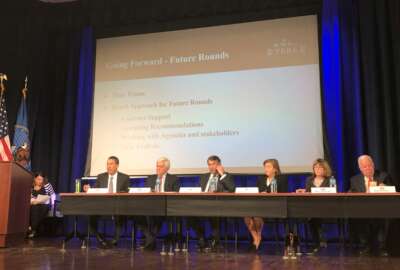To listen to the Federal Newscast on your phone or mobile device, subscribe in PodcastOne or Apple Podcasts. The best listening experience on desktop can be found using Chrome, Firefox or Safari.
- The Congressional Budget Office says agencies will not have to cut their spending because of sequestration in fiscal 2020. The current budget caps, even with adjustments for things like the Census and natural disaster responses, should not breach the topline numbers. CBO says the 2020 cap for defense programs is $746 billion and $654 billion for nondefense programs—about $1.4 trillion in all. CBO does warn, however, that the caps could be breached if lawmakers provide additional funding in 2020 without increasing the budget cap. (Congressional Budget Office)
- While you were asleep last night, the federal debt rose about $2.7 billion. Yesterday’s monthly statement from the Treasury Department confirms, public debt rose by a trillion dollars in calendar 2019. As of December 31, combined federal deficits stood at about $17.2 trillion. Intragovernment holdings bring outstanding securities to more than $23 trillion. The Peter G. Peterson Foundation calculates the government spent $2.5 trillion on interest in the last 10 years, when the gross national debt rose by 90%.
- A 73-year old archive and records center in Seattle, and a former missile site in Montgomery County, Maryland, make up just some of the dozen federal properties the Public Buildings Reform Board has recommended the General Services Administration put up for sale. Once sold, the board estimates those properties will bring in $500-750 million worth of revenue. The Office of Management and Budget has until January 26 to approve the board’s recommendations. (Federal News Network)
- D.C. Del. Eleanor Holmes Norton is trying again to restore appeal rights for certain defense employees. Norton reintroduced a bill that would reverse a 2013 federal court decision, which stripped some 200,000 employees in non-critical sensitive status of the chance to appeal disciplinary decisions to the Merit Systems Protection Board. Norton and Congressman Rob Wittman (R-Va.) previously introduced a similar bill back in 2016. (Del. Eleanor Holmes Norton)
- Air Force Lt. Gen. Thomas Bussiere has been appointed as deputy commander of U.S. Strategy Command. Bussiere will take over for Vice Adm. David Krete. Before the appointment, Bussiere served as the leader of the Alaskan North American Aerospace Defense Command Region. He also previously worked as the commander of the 8th Air Force and the Joint-Global Strike Operations Center. As the deputy commander of STRATCOM, Bussiere will help oversee the military’s nuclear weapons. (Department of Defense)
- The Army began the process to recompete its mega IT hardware contract. The fourth version of the IT Enterprise Solutions contract for hardware will cover nine product catalogs ranging from Unix servers to thin clients and notebook computers to networking equipment. The Army’s draft statement of work for the ITES-4H contract will be a multi-award 10 year contract with a $10 billion ceiling. The Army says ITES-4H is intended to be a total solutions-based vehicle that lets customers field a complete system or as part of a total design solution. The Army has found success with the ITES vehicles with version three receiving more than 48,000 orders since 2016. Comments on the draft RFI are due February 10.
- Army Futures Command will hold pitch days today and tomorrow in Austin, Texas to give small businesses and tech entrepreneurs a chance to help the Army solve modernization challenges. Pitch days allow businesses to talk through their ideas with Army experts. The event is part of the 2020 xTechSearch initiative, which is focused on medical and human performance issues. The Army will choose up to 48 companies to receive $5,000. Winners will move on in the competition until one company will walk away with $250,000.
- Robotic automation, magnetic aircraft covers and more are selected as finalists of the Air Force’s Spark Tank competition. The contest awards airmen who come up with innovative ideas to make the Air Force operate better. The ideas will be shared with senior Air Force leaders at the end of February. The service chose six ideas to make it to the final round. More than 200 airmen submitted ideas this year. Key themes in the projects include improved task management, commercial best practices for healthcare, workforce development, automation, maintenance, airfield assessment innovation and suicide detection and prevention. (Air Force)
- The National Institute of Standards and Technology wants to shore up one of the government’s tools for inventors. The Interagency Edison System is an online platform where those who receive federal funding report their inventions. NIST is seeking feedback on how to modernize and streamline the system to improve security and customer experience.
- DoD and Microsoft plan to finally start building the long-contested JEDI Cloud next month, but Amazon is now asking a federal judge to stop them. AWS filed a bid protest in federal court in November, and until now it’s been content to let the JEDI contract get underway while the case is litigated. But documents filed with the Court of Federal Claims yesterday show Amazon now plans to ask for an injunction to stop work on JEDI. DoD says it considers JEDI an urgent national security priority. Attorneys are asking the court to make a decision on the injunction by Feb. 11. (Federal News Network)
- The House gave Veterans Affairs the green light to explore a new pilot program designed to increase veterans’ access to dental care. The VA MISSION Act created a new center within the department that allows VA to test promising payment and service delivery models. Congress must approve these models before VA can pilot them. A House-passed resolution approved VA’s first pilot request. This pilot program would allow VA to coordinate free or cheaper community dental care for veterans who are otherwise ineligible for similar services within the department. (House Veterans Affairs Committee)
- A bipartisan pair of senators wants to give the VA inspector general subpoena power over former VA employees and contractors. Senate VA Committee Ranking Member Jon Tester (D-Mont.) and Senator James Lankford (R-Okla.) say subpoena authority would help the IG conduct more thorough reviews of the department’s programs, management and contracts. They’ve introduced the Strengthening Oversight for Veterans Act to give the VA inspector general that authority. The IG currently can’t compel executives, employees and contractors who have left the VA to testify or provide needed information for active investigations. (Senator James Lankford)
Copyright
© 2025 Federal News Network. All rights reserved. This website is not intended for users located within the European Economic Area.




